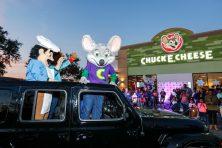Want to hone your DJ skills? Or maybe show them off?
Wedding DJs are in high demand these days.
Industry experts expect 2022 to be the busiest wedding season in 40 years, thanks to lockdown romances and postponed ceremonies during the pandemic.
A wedding DJ is the focal point of great wedding receptions. They set the mood, engage with the crowd and keep the couple happy.
They make good money, too. Wedding DJs make $1,000 per gig on average, according to WeddingWire, with experienced pros fetching upward of $2,000 or more.
But it takes a lot of hard work and planning to DJ a wedding. To start a successful wedding DJ business, you’ll need seed money for gear, reliable transportation — and great people skills.
How to Start a Wedding DJ Business in 9 Steps
Nick Smith started DJing weddings in southwest Indiana when he was 20 years old. His first set of speakers and audio equipment came from a bar that was going out of business.
Sixteen years later, Smith’s business has booked over 200 weddings.
“It’s a great gig if you love people and music,” he said.
1. Research and Talk to Other DJs
Before you invest major money into gear and advertising, make sure you’re comfortable with this type of gig.
Talk to other wedding DJs and ask what challenges they faced in the beginning — and how they overcame those hurdles.
If you’re new to DJing in general, it’s a good idea to shadow a professional wedding DJ. Search Google, Yelp or the Knot to find some in your area.
Send a friendly email asking if you can help them out at an event or two because you’re interested in being a wedding DJ.
On the day of the wedding, show up early and stay for the entire event. Observe how the wedding DJ interacts with the crowd and the type of music they play. Take notes.
Ask yourself the following questions:
- How do they make announcements?
- What do they do when the dance floor thins out?
- How do they handle requests?
- What equipment do they have?
In exchange for the experience, offer to help the other DJ by unloading gear from the car and setting up the speakers.
2. Hone Your Skills
Practice makes perfect. You need to be comfortable behind the booth before you’re ready to book gigs.
Play for family and friends first. You can also book other, smaller events — like birthday parties and company parties — to get your feet wet. Online classes are another way to grow your knowledge base.
Practice playing songs, using a microphone and flowing from one song to another.
If you’re not ready to start your own wedding DJ business quite yet, consider working for a multi-op — a mobile DJ company that employs several disc jockeys.
3. Create a Business Plan
Creating a business plan is important if you plan to invest time and money into becoming a wedding DJ.
Your business plan should include:
- Your business name and location
- Customer demographics and target audience
- Price points
- Suppliers for your equipment
- Initial start-up costs and how long until you’re profitable
- Competitors
You can use one of these templates from the U.S. Small Business Administration to create a more detailed business plan.
The best way to set your initial rates is by researching prices for wedding DJs in your area, then offering a lower price.
How much you charge also depends on where you live: A wedding DJ in a big city earns more money than a wedding DJ in a small town.
Still, a good starting rate for a novice wedding DJ is roughly $500. You can raise your rates as you gain more experience. According to The Knot’s Real Weddings Study, couples spent an average of $1,400 on a DJ in 2021.
Wedding DJs usually pick one or more of the following pricing structures:
- Flat fee or hourly rate
- Packages
- A la carte services
- Custom quote
You should also be open to negotiating when you first start out.
Smith said offering additional services to clients is one of the best ways to make extra money as a wedding DJ.
“Additional services can really help add value,” Smith said. “You can offer things like uplighting, or doing sound for both the ceremony and the reception.”
Consider add-ons that earn you extra money with minimal effort. For example, some DJs offer photo booth services for guests, but Smith said photo booths are labor intensive to transport and set up.
“Unless you have someone else helping you, you want to keep things simple,” he said.
4. Buy Your DJ Gear
A big hurdle for many new DJs is acquiring equipment. It can cost a couple thousand dollars to purchase all your DJ gear.
“It’s a big cost up front for sure,” Nick said, “but you’ll earn it back quickly with gigs.”
While you don’t need state-of-the-art equipment to be a great wedding DJ, you do need a solid foundation to get started.
Wedding DJ gear checklist:
- Laptop with at least 6 GB of internal memory and three USB inputs
- DJ software, like Serato or Traktor
- PA system (amplifier and speakers)
- DJ controller / mixer
- Over-the-ear headphones
- Cables
- MP3 music files
On a budget? Smith recommends looking for deals on sites like eBay and Craigslist. Check out sales at your local music store, too.
You could even borrow equipment from a friend or neighborhood church for your first couple gigs.
“You can start with a cheaper set-up, then upgrade it up over time,” Smith said.
You’ll also need to be comfortable setting up and tearing down your own DJ equipment. Figuring out how to efficiently store and transport your gear is also important if you want to be a mobile DJ.
Buying music is important if you want to run a successful wedding DJ business.
Professionals caution against using streaming services like Spotify or YouTube. It isn’t technically legal and you shouldn’t rely on anything that requires Internet access anyway.
You have several options to legally purchase music for your wedding DJ business:
- Buy mp3s through Amazon or iTunes/Apple Music.
- Subscribe to a DJ pool like Promo City. This is a paid service that gives you access to volumes of modern music for download.
- DJ subscription service like Virtual DJ or Pulselocker.
- Buy used CDs and rip them to your laptop.
Set aside a little money from each gig to buy more music, and it won’t take long to compile a competitive professional DJ library.
5. Market Yourself
You have the gear. You have a plan. Now it’s time to get some customers.
You’ll need to create a DJ website and social media accounts to attract potential customers. Look at websites for other wedding DJ businesses to get ideas.
At the bare minimum, your website should include:
- Your rates
- Where you’re located (and how far you’re willing to travel)
- A contact email address and phone number
- What makes you unique from other DJs in the wedding industry
- Testimonials and positive reviews
You can use a service like Wix or Weebly for free, or hire a professional to design a website for you.
“Recommendations are everything,” Smith emphasized.
Give discounts for referrals. Make it easy for the bride and groom to leave glowing reviews about your wedding DJ business on Google and Facebook.
You’ll want to create some business cards and maybe some flyers, too.
Leave a space in your budget for marketing costs. Advertising on sites like The Knot and WeddingWire can really help pull in new customers because couples often visit these sites to find venues and vendors.
6. Meet the Couple for a Consultation
Meet up with the wedding couple several weeks before the event to discuss the playlist.
Ask about their favorite genres and bands, then create a short list of must-have songs, including their pick for the first dance and other important dances.
“Get an idea of what they’re looking for,” Smith said, “then execute that to the best of your abilities.”
Print a questionnaire for the couple to fill out at the consultation with a timeline of the wedding, names of important people in the wedding party and other key details you should know.
You’ll also want to create contracts you can customize for each couple.
Your business contract should cover things like cancellation fees and damaged equipment policies. Make sure to discuss these policies with clients during the initial consultation.
Finally, prepare to spend several hours communicating back and forth with the couple before the wedding. Smith said he usually spends about 10 hours total preparing for the big day.
7. Create the Playlist
Your goal as a wedding DJ is to create a memorable experience for the couple and keep the party going.
Don’t slide your original deep house remix into the wedding playlist. Remember, focus on the bride and groom — not your personal taste in music.
Play music to match the festivities. Break your songs into different blocks for the ceremony, cocktail hour, introductions, dinner and dance floor.
Each block should have different music to the atmosphere: Classical music at the ceremony, light jazz for the cocktail hour and soulful tunes for dinner, for example.
You can flex more creativity and play new music for the dance floor. But remember: You’re playing for a diverse audience. Don’t be afraid to bust out crowd favorites like “Don’t Stop Believin’” and “Livin’ On A Prayer.”
“People are at a wedding to have a good time,” Smith said. “Your job is to play the right music and create a fun atmosphere for everyone.”
8. Be On Time and Professional
You can’t be late to the party when you’re the DJ. Get there early, set up on time and prepare for a late night.
Before the wedding, write out a script of everything you plan to say. Practice pronouncing names. You don’t want to butcher the best man’s last name on stage.
Make sure to bring backup chargers, cables and other necessary gear. Things go wrong, break and run out of battery. Don’t let something unexpected (but easily preventable) ruin your wedding gig.
9. Work the Crowd and Keep the Party Going
Successful wedding DJs set the tone and vibe for the entire reception.
Be friendly, energetic and don’t forget to smile!
It’s not all about the music, though: You’ll be in charge of making announcements, calling for special dances and fielding song requests from (often intoxicated) guests.
You’ll need to communicate with other vendors at the wedding, too. You don’t want to start playing music for a special dance, for example, without the photographers and videographers in place.
Be observant, flexible and keep the party going.
It’s a lot to manage but pulling off your first successful gig can be the start of a rewarding and lucrative wedding DJ business.








